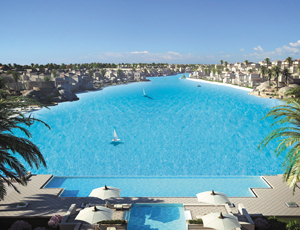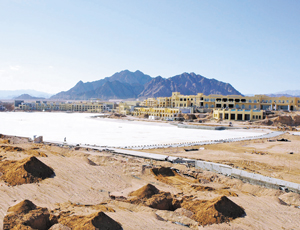

What appears to be a dried-up pond in the middle of a vast construction site at the tip of the Sinai Peninsula in Egypt could set a new record as the world’s largest swimming pool. Details are sketchy, but Crystal Lagoon is set to be the 120,000-sq-meter (29.2-acre) centerpiece of a new resort in Sharm El Sheikh, near the Red Sea coast.
The pool was designed by Crystal Lagoons Corp., a Chilean company led by biochemist-entrepreneur Fernando Fischmann, who has pioneered the development of the huge structures. Fischmann developed a technology to recycle seawater and keep it clean, which makes such large pools viable.
The technology "consists of an innovative process of controlled pulses of chemical additives that allow [us] to use up to 100 times less chemicals in comparison to traditional pool systems," says Felipe Pascual, commercial director of Crystal Lagoons. The approach "also has a process of sound pulses that uses only 2% of the energy of traditional filtration systems,” he adds.
Pascual says the company provides the architectural design of the lagoon as well as the basic and detailed engineering. “We supervise its construction from beginning to end. Once construction has been completed, Crystal Lagoons controls the pool’s operation by using telemetric systems via the internet," he adds. "This enables us to control specific water parameters and take the necessary maintenance actions in due time.”
Cairo-based Engineering Construction Office served as the general contractor, according to Mahmoud Khorshed, a spokesman for Citystars Properties, the pool’s owner.
“Our lagoons are built with a plastic liner developed by Crystal Lagoons Corp. and manufactured in the U.S. exclusively under the Crystal Lagoons brand,” Khorshed tells ENR.
The construction workforce for the Citystars Sharm El Sheikh resort peaked at 1,500; about one-third was involved in building the pool.
The pool is expected to be filled "during the last quarter of 2012," says Lamia Mostafa El Allamy, Citystars director of marketing. She anticipates the resort's "soft opening" will occur by the end of 2012. Once filled, the 591-ft-wide, 2,428-ft-long pool will have an average depth of six feet, 10 in., and a maximum depth of eight feet. It will hold 62.6 million gallons of water. “The water will be recovered from underground aquifers of salty water,” says Pascual. "This water has no alternative use."
Once operational, the pool will be the world’s largest in terms of surface area and exceed by 50% the current record-holder, the San Alfonso del Mar pool in Chile, also developed by Fischmann. Opened in 2006, the San Alfonso pool is listed in the Guiness Book of World Records as the world’s largest pool, at one kilometer in length and 19 acres in area. However, because that pool has a maximum depth of 115 ft, it will retain the world record for most capacity, holding 66 million gallons of treated seawater.
The cost of the Sharm El Sheikh pool was not disclosed, but published reports listed the price tag for the Chilean structure at up to $2 billion, with annual maintenance costing $4 million.
In addition to the the pool, the first phase of the Egyptian resort project is set to include a 415-room resort and 1,200 residential units, says Citystars. Later phases could include 10 other large lagoons and a total of 20,000 housing units, it notes.



Post a comment to this article
Report Abusive Comment